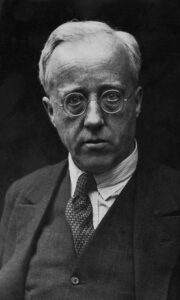Gustav Holst

Gustav Theodore Holst (born Gustavus Theodore von Holst; 1874 – 1934) was an English composer, arranger and teacher.
Born into a musical family in Cheltenham in 1874, Holst began composing whilst still at school, and his first essays into professional life were as the organist and choral director in local Cotswold villages. He won a composition scholarship to the Royal College of Music to study under Stanford, during which time he was invited to conduct the socialist choir at William Morris’ house, where he both met his future wife and discovered the treasures of Ancient Indian literature. Dissatisfied with the stilted translations available at the time, he set himself the formidable task of learning Sanskrit to produce better translations of these great texts (years later, he was to learn Ancient Greek, thus enabling himself to read the Apocryphal Acts of St John in the original, for setting in the Hymn of Jesus).
Having spent his early professional years attempting to make ends meet first as a trombone player in various bands, and then solely as a composer, Holst took up various teaching jobs, most significantly at St Paul’s Girls’ School (the only teaching post he held until his death). Unable to sign up in the war due to his neuritis and poor sight, he was sent to Macedonia in 1918 to organize music for the troops in the Middle East, conducting English music in Salonica and Constantinople.
On his return to England, Holst found himself facing fame and success; performances of the Hymn of Jesus and Planets Suite had provoked great excitement and interest in the musical world. (The only time the Queen’s Hall was sold out twice in one week was when Holst conducted his own works there.) Naturally a shy, quiet and private man, he deeply disliked the attention of the press and longed instead for quiet recognition amongst musicians alone – indeed, his later fall from popularity, due to his works being too obscure, esoteric and exacting for the audiences of the time, pleased him.
His later life continued to be divided between the Essex village of Thaxted and London, teaching and composing in his sound-proofed room in the new music wing of St Paul’s Girls’ School. Although never a physically robust man, he enjoyed walking throughout his life, and when confronted in his sixtieth year with a choice between a potentially dangerous operation or a compromised lifestyle that would not allow for country rambles, he chose the former. Although the operation was successful, his heart was not up to the strain, and he died two days later, on 25th May 1934.
Holst’s output ranged from solo song and short piano pieces to choral symphonies and opera; following his own advice that one should ‘never compose anything unless the not-composing of it becomes a positive nuisance to you’, all his works have something valuable to impart. Mystical, often austere, brilliantly orchestrated with exquisite economy of instrumentation, his works combine clarity of vision with hauntingly beautiful and sometimes desolate lyricism. His dearest friend, Ralph Vaughan Williams aptly remarked ‘Holst was a visionary but, at the same time, in all essentials, a very practical man… It is the blend of the visionary with the realist that gives Holst’s music its distinctive character’.
